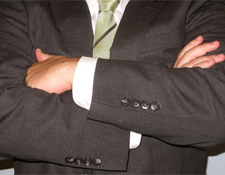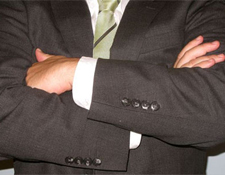
 If you aren’t a little nervous on entering a job interview then it might be worth questioning how much you really want it. Nerves show that the opportunity means a lot to you and that you want to get it right, something many employers will be fully aware of (however much they let you squirm). But it’s still important to make sure these nerves don’t conceal the true passion you have for the job – or worse, distract from it.
If you aren’t a little nervous on entering a job interview then it might be worth questioning how much you really want it. Nerves show that the opportunity means a lot to you and that you want to get it right, something many employers will be fully aware of (however much they let you squirm). But it’s still important to make sure these nerves don’t conceal the true passion you have for the job – or worse, distract from it.
Niklas Vaittinen, Marketing Executive at the Graduate Recruitment Bureau agrees and tells us “your interviewer(s) have probably interviewed a great number of applicants during their career and have learnt to pick up on body movements that you might make subconsciously.” It’s not only your mouth that does the talking; your body language will speak volumes before you’ve even had the chance to sit down. So, whilst you’re focusing hard on how your words are being perceived, be careful what else is being communicated.
SMILE – No matter what the job, however worried you are or how formally they choose to approach you, everybody wants an employee-friendly environment to work in. You’re pleased to be here remember? All that time memorising the company history, wording and rewording cover letters and trawling blindly through repetitive job sites… make sure they know that. At the very least you want to avoid having to go through this trauma all over again. Whether it’s your dream job or a small step in the right direction, a smile will immediately break the tension and stimulate friendlier relations. Avoiding eye contact will also imply you have something to hide or aren’t great with people. Keep it friendly, conversational, but not constant – just because you’re feeling a little intimidated doesn’t mean you want to return the favour.
THE HAND SHAKE – and we don’t mean the nervous sort. A firm hand clasp with direct eye contact and a smile is traditional procedure and has been scientifically proven to communicate everything from strength of mind, level of intellect to how open you are to new experiences. You might not be able to control the sweaty palms (although it’s worth giving them a quick wipe before you go in), but a floppy wrist says more dead fish than professional business mind. At the same time it’s not an arm wrestle. You don’t need to crush their fingers to get the message across: aggressive, intimidating and forceful, as opposed to ambitious, strong-minded and purposeful? You do the maths…
POSTURE – So you’ve got the formalities out of the way, now it’s time to settle into the hot seat. It doesn’t take a genius to know that slouching back isn’t going to give a great impression. This will bring you across as either over-confident and arrogant, immature with an attitude problem or simply that you don’t care about the job. Understandably interview behaviours can be a bit alien to many, but at the other end of the scale, sitting uncomfortably with a poker straight back can be equally as damaging. This might imply you aren’t comfortable around new people, that you might buckle under pressure and in general makes the whole situation more awkward. What happens if you’re asked to sit with clients in a similar scenario? Sitting comfortably but attentive will release both tension and a more professional vibe.
WHAT MAKES YOU TICK? – Many people have nervous fidgets that they don’t even realise. If you haven’t already worked out what these are then keep potential pen clicks out of reach, tapping fingers and toes in check and take a sip of water to calm shaking hands. If an employer picks up on a habit and finds it more distracting than what you’re saying then it could be hugely detrimental to your progress. For this reason, asking for feedback after any rejection is hugely important as it will not only allow you address a particular approach you might be taking, but will equally build up your confidence for the next one. You might obliviously conclude that you lost out on merit, when actually they just couldn’t stand you twiddling your hair and fiddling with your bag buckle for twenty minutes.
Bringing yourself back into the picture for an employer’s consideration after a failed interview will not only show you’re ambitious and keen for self-improvement, but might even put you forward for recommendation to an alternative role or future opportunity. Niklas’ words do well to sum up: “As long as you don’t pick your nose during your interview (yes, this has happened!), being yourself and showing motivation for the job carries a long way.” Just make sure your body language is telling them the same thing.
Leave a Reply